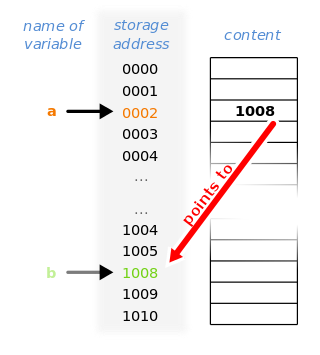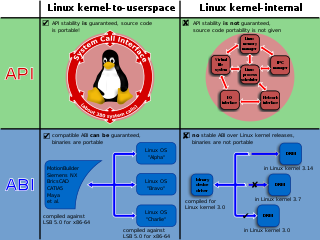C is a general-purpose computer programming language. It was created in the 1970s by Dennis Ritchie, and remains very widely used and influential. By design, C's features cleanly reflect the capabilities of the targeted CPUs. It has found lasting use in operating systems, device drivers, and protocol stacks, but its use in application software has been decreasing. C is commonly used on computer architectures that range from the largest supercomputers to the smallest microcontrollers and embedded systems.
Common Intermediate Language (CIL), formerly called Microsoft Intermediate Language (MSIL) or Intermediate Language (IL), is the intermediate language binary instruction set defined within the Common Language Infrastructure (CLI) specification. CIL instructions are executed by a CIL-compatible runtime environment such as the Common Language Runtime. Languages which target the CLI compile to CIL. CIL is object-oriented, stack-based bytecode. Runtimes typically just-in-time compile CIL instructions into native code.
GNU Bison, commonly known as Bison, is a parser generator that is part of the GNU Project. Bison reads a specification in Bison syntax, warns about any parsing ambiguities, and generates a parser that reads sequences of tokens and decides whether the sequence conforms to the syntax specified by the grammar.
In computer science, read-copy-update (RCU) is a synchronization mechanism that avoids the use of lock primitives while multiple threads concurrently read and update elements that are linked through pointers and that belong to shared data structures.
In computer programming, indentation style is a convention, a.k.a. style, governing the indentation of blocks of source code that is generally intended to convey structure.

In computer science, a pointer is an object in many programming languages that stores a memory address. This can be that of another value located in computer memory, or in some cases, that of memory-mapped computer hardware. A pointer references a location in memory, and obtaining the value stored at that location is known as dereferencing the pointer. As an analogy, a page number in a book's index could be considered a pointer to the corresponding page; dereferencing such a pointer would be done by flipping to the page with the given page number and reading the text found on that page. The actual format and content of a pointer variable is dependent on the underlying computer architecture.
In compiler construction, name mangling is a technique used to solve various problems caused by the need to resolve unique names for programming entities in many modern programming languages.
In computing, a memory barrier, also known as a membar, memory fence or fence instruction, is a type of barrier instruction that causes a central processing unit (CPU) or compiler to enforce an ordering constraint on memory operations issued before and after the barrier instruction. This typically means that operations issued prior to the barrier are guaranteed to be performed before operations issued after the barrier.
In the C++ programming language, a reference is a simple reference datatype that is less powerful but safer than the pointer type inherited from C. The name C++ reference may cause confusion, as in computer science a reference is a general concept datatype, with pointers and C++ references being specific reference datatype implementations. The definition of a reference in C++ is such that it does not need to exist. It can be implemented as a new name for an existing object.
The GNU coding standards are a set of rules and guidelines for writing programs that work consistently within the GNU system. The GNU Coding Standards were written by Richard Stallman and other GNU Project volunteers. The standards document is part of the GNU Project and is available from the GNU website. Though it focuses on writing free software for GNU in C, much of it can be applied more generally. In particular, the GNU Project encourages its contributors to always try to follow the standards—whether or not their programs are implemented in C.
The Thread Information Block (TIB) or Thread Environment Block (TEB) is a data structure in Win32 on x86 that stores information about the currently running thread. It descended from, and is backward-compatible on 32-bit systems with, a similar structure in OS/2.

The Linux kernel provides multiple interfaces to user-space and kernel-mode code that are used for varying purposes and that have varying properties by design. There are two types of application programming interface (API) in the Linux kernel:
- the "kernel–user space" API; and
- the "kernel internal" API.
typedef is a reserved keyword in the programming languages C, C++, and Objective-C. It is used to create an additional name (alias) for another data type, but does not create a new type, except in the obscure case of a qualified typedef of an array type where the typedef qualifiers are transferred to the array element type. As such, it is often used to simplify the syntax of declaring complex data structures consisting of struct and union types, although it is also commonly used to provide specific descriptive type names for integer data types of varying sizes.
In computer programming, the term hooking covers a range of techniques used to alter or augment the behaviour of an operating system, of applications, or of other software components by intercepting function calls or messages or events passed between software components. Code that handles such intercepted function calls, events or messages is called a hook.
Platform Invocation Services, commonly referred to as P/Invoke, is a feature of Common Language Infrastructure implementations, like Microsoft's Common Language Runtime, that enables managed code to call native code.
The C and C++ programming languages are closely related but have many significant differences. C++ began as a fork of an early, pre-standardized C, and was designed to be mostly source-and-link compatible with C compilers of the time. Due to this, development tools for the two languages are often integrated into a single product, with the programmer able to specify C or C++ as their source language.
In computer programming, DLL injection is a technique used for running code within the address space of another process by forcing it to load a dynamic-link library. DLL injection is often used by external programs to influence the behavior of another program in a way its authors did not anticipate or intend. For example, the injected code could hook system function calls, or read the contents of password textboxes, which cannot be done the usual way. A program used to inject arbitrary code into arbitrary processes is called a DLL injector.
splice is a Linux-specific system call that moves data between a file descriptor and a pipe without a round trip to user space. The related system call vmsplice moves or copies data between a pipe and user space. Ideally, splice and vmsplice work by remapping pages and do not actually copy any data, which may improve I/O performance. As linear addresses do not necessarily correspond to contiguous physical addresses, this may not be possible in all cases and on all hardware combinations.
A weak symbol denotes a specially annotated symbol during linking of Executable and Linkable Format (ELF) object files. By default, without any annotation, a symbol in an object file is strong. During linking, a strong symbol can override a weak symbol of the same name. In contrast, in the presence of two strong symbols by the same name, the linker resolves the symbol in favor of the first one found. This behavior allows an executable to override standard library functions, such as malloc(3). When linking a binary executable, a weakly declared symbol does not need a definition. In comparison, a declared strong symbol without a definition triggers an undefined symbol link error.
A code sanitizer is a programming tool that detects bugs in the form of undefined or suspicious behavior by a compiler inserting instrumentation code at runtime. The class of tools was first introduced by Google's AddressSanitizer of 2012, which uses directly mapped shadow memory to detect memory corruption such as buffer overflows or accesses to a dangling pointer (use-after-free).

